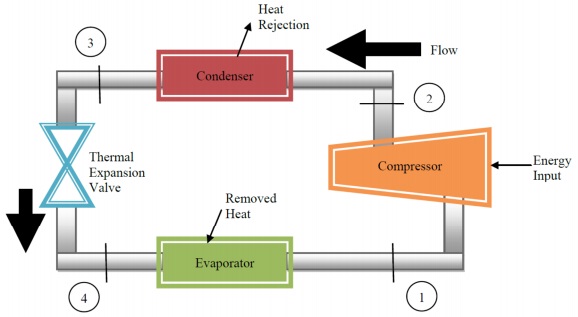Problem:
A refrigeration system is to be designed to maintain the temperature in the range -15°C to -5°C, while the outside temperature varies from 15°C to 25°C. The total thermal load on the storage unit is given as 20 kW. Obtain an initial design for the vapor compression refrigeration system shown in Figure. Choose a safe and suitable refrigerant. For safe operation and other factors, such as additional energy transfer, design the system using a safety factor of 1.3.
The compressor efficiency could range from 60 to 80 percent.
Need to specify or/and determine the temperatures and pressures at the different states and show the cycle with the vapor dome on a temperature entropy (T-s) diagram. Also, need to determine the coefficient of performance value and the mass flow rate of the working fluid.

DESIGN METHODOLOGY:
Assumptions:
To obtain an initial design of a refrigeration system as requested by the problem statement, the following assumptions are made:
• The four components (compressor, condenser, evaporator, thermal expansion valve) of the thermodynamics cycle are modelled as open systems.
• The four components (devices) operate under steady-state, steady-flow process.
• The changes in kinetic and potential energies across each device are negligible.
• Both the compressor and the expansion device are considered adiabatic (i.e. the heat transfer from these devices is negligible).
• Both the evaporator and the condenser are considered constant pressure devices.
Thermodynamics Modelling.
The basic concept of this design is to use a vapor compression cycle. Utilizing the first and second laws of thermodynamics .